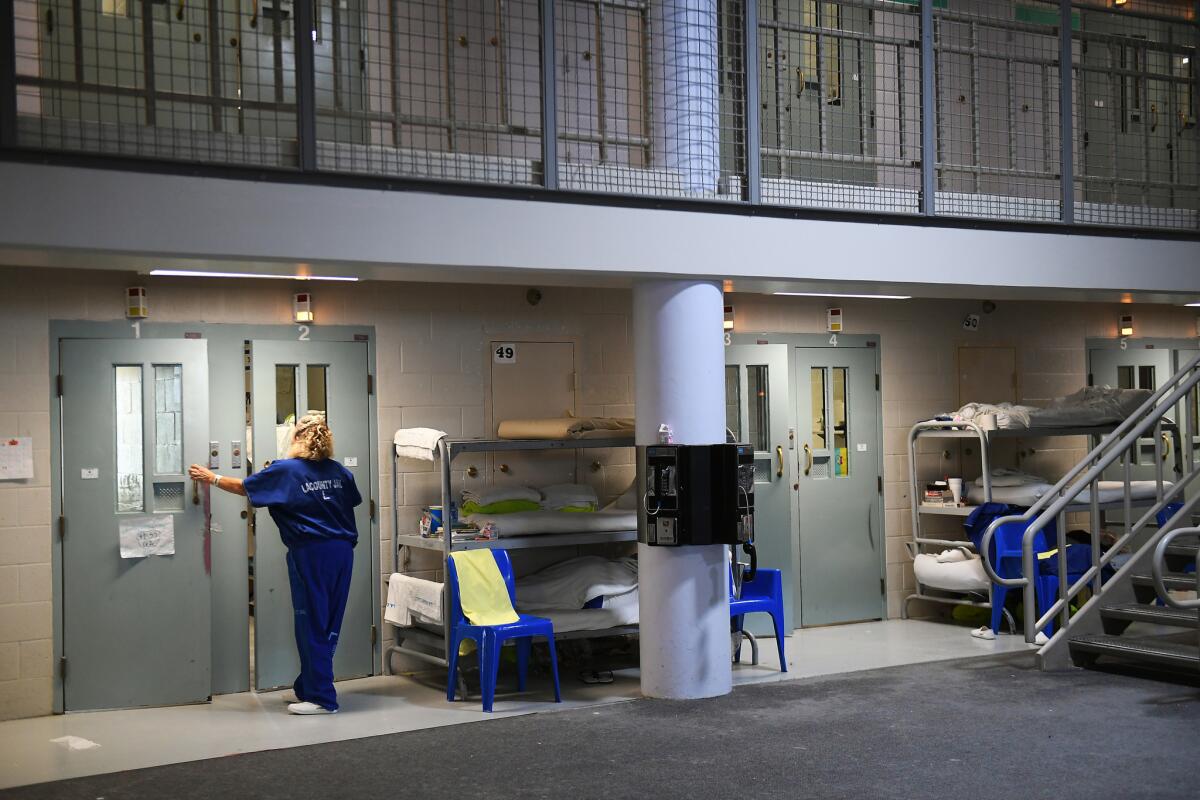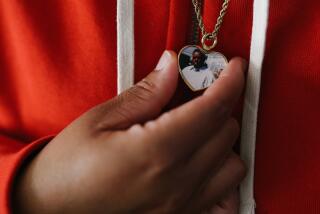Women were brutally strip-searched in L.A. County jails. Now we have to pay for it

The women were ordered to line up outdoors, strip, and toss their clothes onto the concrete in front of them. Beneath their bare feet, oil from the buses that regularly idled on the same spot mingled with blood left by previous waves of female prisoners.
Guards cursed, barked commands, made crude jokes about the odor, snickered at the naked bodies. They ordered the women to stand so close that their shoulders touched. They ordered them to use their fingers to separate their gums and their lips so that their mouths could be searched and then, without offering them a chance to wash first, to use their hands to spread their buttocks and their vaginas. They ordered them to bend over and cough as the guards examined their body cavities with flashlights.
If they were menstruating, the women were ordered to remove their pads and tampons as blood ran to their feet. They stumbled into each other as they spread their toes to be inspected.
They shivered in the cold night air and, sometimes, the rain. Some cried. Facing them, watching them, they could see another line of naked women undergoing the same ordeal. Both lines were visible to workers, male and female alike, through a chain-link fence alternately covered and uncovered by a tattered tarp that blew in the wind.
Wave after wave of women were bused in to be strip-searched in this manner.
This was not a concentration camp or a high security military prison. This was the Century Regional Detention Facility ― the women’s unit of the Los Angeles County jail in Lynwood ― and these strip searches were routine until just a few years ago. They were the humiliating counterpart of the cruel (and unconstitutional) beatings of male inmates at the county’s Men’s Central Jail. Those beatings led to an FBI investigation, federal prosecutions and prison sentences for more than a dozen L.A. County Sheriff’s Department personnel, including Sheriff Lee Baca.
Now the unnecessarily degrading and intrusive group strip searches have culminated in a $53-million settlement award in a class-action lawsuit brought in 2010 on behalf of 87,937 women who were searched a total of 421,718 times between March 2008 and January 2015. The agreement was filed with the court Tuesday.
Today, searches for concealed weapons and other contraband are conducted using airport-style full-body scanners. So one might be tempted to conclude that the problem has been solved. Scanners are no big deal, right? We can move on.
But L.A. County has yet to move on. The same toxic culture that led to brutality against inmates of both sexes persists. The same ignorance of women and their particular needs continues.
The county had once planned to replace the Lynwood jail with a repurposed collection of buildings in the desert, far from families and support services. The Board of Supervisors wisely changed course earlier this year. But despite having established a “gender-responsive” panel to home in on women’s needs, officials have yet to land on an alternative that permits incarcerated mothers to spend time with their young children or, better yet, that keeps any woman ― or indeed any man ― out of jail before trial if they don’t need to be there. Part of the massive settlement will go to outside contractors to do what the Sheriff’s Department proved incapable of doing itself ― to craft policies that in turn create a culture that permits women accused of crimes to be safely confined without being degraded or humiliated.
Critics might complain that group strip searches are just a fact of life for inmates, and that women were treated no differently from men. But in most other jails around the nation, such searches were not routine. And in Los Angeles County, male inmates in fact were not subjected to the same level of search. And of course differences in anatomy mean that strip searches of female inmates more closely approach the line that separates sexual humiliation from sexual assault.
Anyone still unable to summon much concern for abused or humiliated inmates should remember to open their wallets and pull out a five-dollar bill and some spare change besides. That’s what the cost comes to when averaged out among each L.A. County man, woman and child, under the settlement, for seven years of brutal abuse. And that of course doesn’t include all the other settlements and payouts for the many other instances of inmate mistreatment over the last decade, including nearly $4 million (so far) for women locked up in Lynwood who say a male sheriff’s deputy sexually assaulted them.
It didn’t have to be that way. That’s the final insult ― that in the strip-search case and numerous others, plaintiffs’ lawyers were ready to settle at an earlier date, for a lower amount, when there were fewer class members and less evidence of misconduct. But the county’s lawyers routinely focus too much on fighting legitimate claims and too little on fixing the problems. That means more people being needlessly hurt more deeply and more often. And the rest of us paying more because of it.
More to Read
A cure for the common opinion
Get thought-provoking perspectives with our weekly newsletter.
You may occasionally receive promotional content from the Los Angeles Times.






